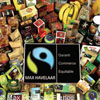Here’s the link: a commercial partnership based on dialogue, transparency, and respect, aimed at greater equity in international trade. Introducing a means of taking solidarity action within our reach: fair trade.
In conventional trade, the pursuit of the most competitive price has dramatic effects on both workers and the environment. In response to this situation, fair trade offers quality products at a price satisfactory for both the producer and the consumer. The price paid to the producer for their goods must cover their raw materials and means of production (tools and machines). It should also enable them to earn a living wage to meet the basic needs of their family (access to decent food, healthcare, education), prepare for the future (investments, quality improvement and diversification of production, strengthening organizations and skills), and finally meet the requirements of fair trade organizations (democratic and transparent operation, improved conditions for workers and the environment).
### A Look Back…
Who is Max Havelaar? This Robin Hood, forged in 1860 in the novel *Multatuli* by Edouard Douwes Dekker, was originally a Dutch civil servant. He revolted against the oppression suffered by the Javanese people in the Dutch East Indies, a colony of the Netherlands. This story explains the emblematic choice of this name for the international association founded in 1988 by economist Nico Roozen and missionary Frans van der Hoff.
The goal of the Max Havelaar association is to provide a label that involves commercial players and identifies fair trade products. All links in the fair trade chain—producer organizations in the South, importers, manufacturers—are approved (contractual commitment to comply with imposed standards). The label is a guarantee for you. It allows for the segmentation of product offerings from Southern countries and “democratizes consumption” by making it accessible to a wider audience.
### I Want to Take Action! But How?
By trying this: replace a product from traditional commerce with a fair trade one, stroll through shops, a wide range of products is offered. Don’t hesitate to ask for fair trade tea, coffee, or chocolate in your places of consumption. Suggest fair trade gift baskets to your company’s works council, participate in or organize a tasting of fair trade products. Take advantage of events such as Fair Trade Student Week (March) and the Fair Trade Fortnight (late April, early May) to discover the products. Try out fair trade buffets with your friends and family. Try fair trade clothing, attend a fair trade fashion show, etc. There are plenty of ways to take action; it’s up to you to implement them at your own scale, according to your desires, and your commitment!
Some Useful Links
[Max Havelaar France](https://www.maxhavelaarfrance.org/) |
[Commerce Equitable](https://www.commercequitable.org/) |
[Artisans du Monde](https://www.artisansdumonde.org/) |
[Ethical Fashion Show](https://www.ethicalfashionshow.com/)
*By* Céline MERRICHELLI


